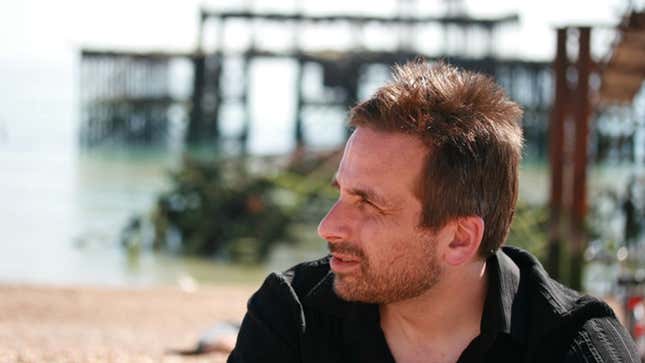
An article appearing on Bloomberg today reports that industry veteran Ken Levine’s studio Ghost Story Games is not a happy place to be. Half the company’s founders having quit, along with many staff, and after eight years there’s still no sign of a game.
Levine is perhaps most famous for 2007's BioShock, a first-person action ‘em up that was unquestionably a milestone game in the industry. Previously he had been a key figure in the development of all-time greats like Thief: The Dark Project, System Shock 2, and Freedom Force, working with Looking Glass and his own studio, Irrational Games. While he is all-too-often mistakenly described as an “auteur,” Levine is undeniably a pivotal figure in 21st century video games.
In 2014, Levine declared that Irrational would be closing down, and that he was creating a new studio—Ghost Story Games—to focus on narrative-led projects for owner Take-Two. In 2022, no such project has ever been made public, and Bloomberg reports this may be a result of Levine’s leadership style and lack of management skills.
Up-and-coming games journalist Jason Schreier reports, “Levine’s managerial style has led to burnout and, former employees say, caused a lot of pain.”
In that 2014 announcement, Levine surprised the majority of Irrational Game’s employees with being made redundant, despite the enormous success of their most recent game, BioShock Infinite. He wanted to work somewhere smaller, with far less stress and pressure, so fired swathes of people to achieve this. At the time, much was made of his proposal to create “narrative Lego,” games offering stories that would be completely unique to every player, or entirely different each time they were played. Which is, you know, a thing a lot of people say before they start.
There was a lot of money sloshing about to try, however. Owned by Take-Two, but with just 12 employees, the idea was to have a studio with enormous resources to explore these creative ideals. However, given they’ve released a total of zero games, clearly something about this wasn’t working.
According to Bloomberg, one Ghost Story founder, Mike Snight, quit the studio citing Levine’s “creative process” as the factor that drove him out. He went with half the other founders. Six of whom told Schreier that the indie-size of the studio didn’t impinge on Levine’s desires to create something on a AAA scale. It was to be set on a space station, with three factions with whom players could align or oppose, aimed to release in 2017.
By 2016 the team appears to have scaled up to about 30 people (right now the studio’s site reports 32 employees), but as Bloomberg states, the ambitions went far beyond what such a small group could realize.
Two early employees of the studio recalled a version from around 2016 with elaborate levels and rich, three-dimensional graphics. They wondered how they’d finish it with fewer than 30 people on the team. Others remembered a complicated dialogue system that would morph based on player choices, requiring a tremendous amount of writing that couldn’t have possibly been completed within a year.
Unfortunately, it seems that if one person has bought into the “auteur” theory, it’s Levine himself. While projects like System Shock 2 and BioShock were the work of hundreds of people, the press (hello) were guilty of giving individuals far too much credit in response to a project. A burden no developer can ever really carry. According to Bloomberg’s article, Levine has tried despite this. His leadership style is one that frequently sees months of other people’s work discarded at his whim.
On previous projects, budgets and release dates have forced this practice to come to an end at some point, unfortunately usually with a lot of crunch. But with the enormous freedoms at Ghost Story, it seems Levine’s behavior has been far more unchecked, and as such this first project has been allowed to slip into its fifth year after its originally intended release.
Bizarrely, it seems Levine’s desire to make something so infinitely adaptable to the player is also something he wants to be able to see in every aspect on a cinematic level. Schreier implies multiple current and former employees of Ghost Story were unable to explain to Levine that these two concepts can’t co-exist.
Levine would often assess aspects of the game when they were not yet finished, decide they weren’t good enough and command the team to scrap or change them, employees say. “The type of game being explored does not match well with the creative process being used,” says Andres Gonzalez, a founding member who left to start a new company with Snight.
It also sounds like Levine might be a bit tough to work with. Schreier perhaps euphemistically describes a “mercurial demeanor,” while alleging that some who “sparred” with Levine then “mysteriously stopped appearing in the office.”
None of which really sounds like a great environment in which to conceive of groundbreaking games. As reported by Bloomberg, current employees say they don’t see a way anything could be released for at least another couple of years. Which, if nothing else, rather puts pay to the nonsense of Levine’s being an auteur, given no game has been created when left to his own devices.